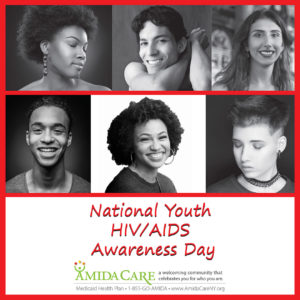National Youth HIV & AIDS Awareness Day: An AIDS-Free Generation Is Within Our Reach

Youth ages 13 to 24 account for more than 1 in 5 new HIV diagnoses, according to the Centers for Disease Control (CDC). In New York State, more than 600 young men of color are getting this news each year.
These startling statistics are the reason for National Youth HIV & AIDS Awareness Day, an annual observance that takes place on April 10. As we think about our vision of a future without AIDS, we must look to young people. Ending the HIV/AIDS epidemic calls for both focusing our efforts on preventing new infections while supporting youth who are already living with HIV.
Young African American and Latino gay and bisexual men are especially affected. If current diagnosis rates persist, half of Black gay men and a quarter of Latino gay men will be diagnosed with HIV during their lifetimes. Young women of color and people of transgender experience also suffer disproportionate rates.
More programs, services, and resources targeted to at-risk young people are needed to help prevent HIV infections as well as provide treatment for those living with HIV. Amida Care has long been active throughout New York City communities to reach those at risk for HIV. For instance, one current focus is the Kiki community, where outreach workers help educate young people about the importance of HIV testing, treatment, and prevention tools like pre-exposure prophylaxis (PrEP).
So, what can young people do to reduce the risk of acquiring HIV?
• For people who are HIV-negative but have a high risk of getting HIV, a combination of medications taken in one pill daily called pre-exposure prophylaxis or PrEP might be right for them. PrEP is more than 90 percent effective in preventing HIV transmission.
• For those who may have been exposed to HIV through sex or injectable drug use, a short treatment called post-exposure prophylaxis or PEP is available. To be effective, it should be taken as soon as possible but not more than the first 72 hours after exposure to HIV.
• And, of course, early HIV testing and treatment is crucial.
For those who have contracted HIV, comprehensive, culturally-competent care that addresses all aspects of health – including medical, sexual, and mental health; social support services; and substance use treatment – is critical for young people to become virally suppressed and stay well.
For more information, check out the following resources:
• National Youth HIV & AIDS Awareness Day
• Advocates for Youth
• HIV.gov
Amida Care can also help. Amida Care is a Special Needs Health Plan (SNP) that currently serves 6,700+ members throughout the five boroughs of New York City, including people living with HIV/AIDS; people of transgender experience, regardless of HIV status, and people who are experiencing homelessness, regardless of HIV status. Please contact us at 1-855-GO-AMIDA to be directed to more health resources.
